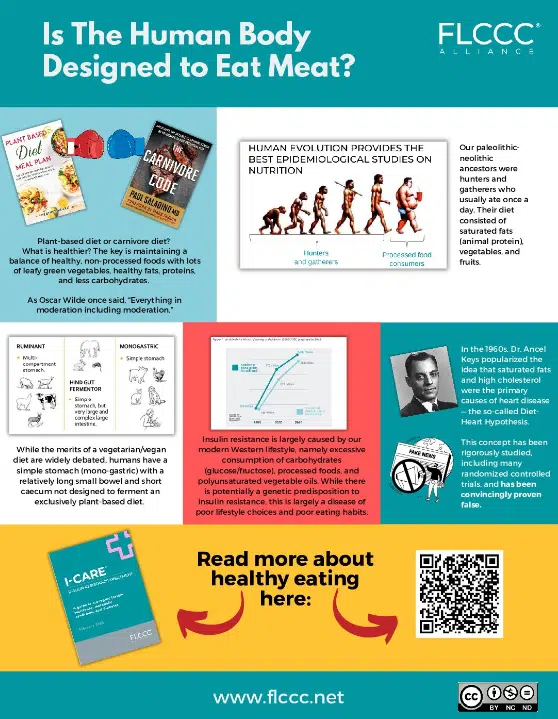They say eating meat is bad for you and the environment. We’re here to debunk those myths and more! Looks like meat’s back on the menu.

These days, you needn’t look far to find claims that meat is unhealthy. The anti-meat crowd has grown into an entire industry, empowering themselves with a laundry list of claims like:
- Eating meat is generally bad for you
- It leads to heart disease, stroke, and diabetes
- And meat hurts the environment
The people who cite these claims may be well-intentioned, but they are not well-informed. The science that guides them is not only outdated but, in many cases, it was wrong from the start.
With so many conflicting studies, no wonder so many are asking if it’s unhealthy to eat meat! If you have with questions, don’t fret. Our medical experts have sifted through the research to give you answers.
So, keep reading! In this post, we’ll debunk 5 myths that say eating meat can be harmful.
5 Myths About Why Eating Meat is Unhealthy
Before we debunk these 5 myths, consider this: our most ancient ancestors subsisted primarily by eating meat. To this day, there are human populations (like the Inuit) who eat almost nothing but meat.
For most of known human history, the only source of protein was meat… and we survived! Fast forward to modern day, and an average of 86% of people eat meat regularly. That’s according to a survey by Statista that asked people from 21 countries about their meat-eating habits.

With all that in mind, let’s investigate these meat myths:
- Meat is bad for your health overall
- Eating meat can increase the risk of diabetes
- Fruits and vegetables are more nutritious than meat
- Eating meat and saturated fats leads to heart disease and stroke
- Meat hurts the environment and our health
Here’s a shocker: studies that start with the hypothesis of “why eating meat is bad for your body” almost always find the same. As we’ll find out, the myth of harmful meat is one of the oldest lies in modern science.
Myth 1: Meat is bad for your health overall
There are many studies suggesting the negative health effects of meat. Among them are studies claiming that:
- Eating meat puts people at higher risk of colorectal cancer (colon cancer)
- Eating meat increases your risk of heart disease or stroke
The problem with these meat studies, and nutritional studies in general, is that they have many limitations. The biggest one is that many broad nutritional studies are “observational” rather than “experimental.”
An observational study is a kind of study that looks at existing data and attempts to make conclusions based on it. The issue with that is it becomes challenging to rule out confounding factors:
- How many people in the study were smokers?
- How many were stressed out?
- How many had a family history of heart disease?
Since it’s impossible to rule out confounding factors like the above, it’s impossible to establish causation, only correlation. That’s exactly the problem with the studies that claim meat is bad for your health.
Instead of cutting meat out of your diet altogether, why not make healthier choices? Here’s an easy way to do that: eliminate factory-farmed and processed meats from your diet!
If you aren’t sure what to look out for, check out our guide on How To Read Food Labels for a helping hand.
Myth 2: Eating Meat can increase the risk of diabetes
The myth that meat causes Type II diabetes is one of the more sinister on this list. The claim originates from studies like this one conducted by the Harvard School of Public Health.
The funny business starts in the study design. One obvious flaw: they are looking at the effects of red and processed meats in the same cohort. That means people eating a grass-fed steak are in the same group as people eating fast food hot dogs.
The Harvard study is yet another observational study making yet another bold claim. They found that participants who ate the most red meat had a 62% higher chance of developing Type II diabetes.
This myth couldn’t be any easier to debunk. We just need to figure out if red meat impacts risk factors like insulin resistance, fasting glucose, etc. That’s an experiment many non-scientists could do at home!
Luckily, that study has already been done by the European Journal of Clinical Nutrition. It proved red meat has no impact on diabetes risk factors at all. And why would it? Protein-rich foods don’t impact blood sugar levels… sugar does!
Here at the FLCCC, we know research shows that sugar is the real enemy – not meat. We’ve written several guides all about the many health benefits associated with a diet low in sugar and processed foods:
- All About the Glycemic Index
- I-CARE: Insulin Resistance
- Reduce Insulin Resistance with Magnesium
- All About the Glucose Ketone Index
Myth 3: Fruits and vegetables are more nutritious than meat
Many people can make a plant-based diet work well for them. If it’s working for your health, stay with it.
But since we’re busting myths today, let’s debunk the common misconception that fruits and vegetables are “the healthy foods.” The truth is fruits, veggies, and meat all have their unique health benefits.
While fruits are nutritious, it’s important to eat them in moderation, as some can be high in sugar. A balanced approach to diet, including a variety of food groups, is key to maintaining good health.
For example, most people know meat doesn’t have much vitamin C. That’s why sailors used to take citrus fruits on long sea trips to avoid scurvy. Similarly, there are important vitamins and minerals that fruits and vegetables don’t have much of either.
The first and most obvious health benefit found richly in meat is protein… otherwise known as the building blocks of life! Your body needs protein for tissue repair, growth, hormone and enzyme production, plus a lot more.

Meat is Incredibly Nutrient-Dense
But that’s not the only reason meat is nutritious. Meat also contains a whole range of vitamins and minerals scarcely found in fruit or vegetables:
- Iron: Specifically, heme iron, which is found in animal foods and is more easily absorbed by the body than non-heme iron from plant sources.
- Zinc: Meat is a significant source of zinc, essential for immune function, DNA synthesis, and cell division.
- Vitamin D: Especially in fatty fish like salmon, mackerel, and tuna. Few plant foods naturally contain vitamin D.
- Omega-3 Fatty Acids: Found in high amounts in fatty fish. Crucial for brain health.
- Selenium: Found in high amounts in meats, particularly in organ meats and seafood.
- Vitamin A: In the form of retinol, which is the active form of vitamin A found only in animal products.
- Vitamin B2 (Riboflavin): Meat, especially organ meat, is a rich source of riboflavin.
- Vitamin B3 (Niacin): Meat is a significant source of niacin, important for energy metabolism.
- Vitamin B6: Found in higher amounts in meat compared to most plant-based foods.
- Vitamin B12: Crucial for nerve function and the production of DNA and red blood cells. Found in high amounts in all meats, especially liver and other organ meats.
Based on the above list, who could argue that meat is unhealthy? It’s part of a balanced diet, much like the one we describe in our Eat Well: Guide To Fasting and Healthy Eating.
Myth 4. Eating meat and saturated fats leads to heart disease and stroke
Research that claims meat is bad for our health often cites saturated fats as the culprit. The premise is that meat often has a lot of saturated fat, therefore meat is bad.
But is that true? Here’s what we know: the sugar industry has been paying for researchers to publish studies saying fat is the enemy since the 1960s. That dubious premise “derailed the discussion about sugar for decades,” according to Stanton Glantz, author of a JAMA paper published in 2016.
It was that kind of research that ushered in the low-fat era that arguably continues to this day. Think of the kinds of food products that were created to “solve the problem” of fat for humanity:
- Margarine (hydrogenated oil and trans fats)
- Low-fat snacks (high-fructose corn syrup)
- Processed meats (artificially low-fat versions of meat)
- Fat-free dairy (often with sugar added)
- Low-fat frozen meals (with loads of salt and sugar in place of fat)

It’s now universally understood that foods like those have caused harm. They contain more sugar and salt combined with hydrogenated oils and trans fats that our bodies cannot digest. What’s more, recent data shows that saturated fats are healthy with lower risk of mortality; further proof it’s the carbohydrates that are causing health issues.
The good news is that there are many ways to get healthy fats into our diets. And we’ve written another guide about that here: Healthy vs. Unhealthy Oils – check it out!
Myth 5. Meat harms the environment and our health
Have you seen any of the recent documentaries that claim vegetarian and/or vegan diets are superior to diets that include meat? One of their main points is that meat production as an industry leaves a huge carbon footprint in its wake.
Though we do need to consider the environmental impact of everything we produce, is it fair to shift the blame squarely on meat? Consider that:
- Plant agriculture is very dependent on pesticide use
- Deforestation to increase the amount of soy farming in areas like Brazil is rampant
- Making matters worse, much of the soy produced is used to feed livestock for meat and dairy production
In other words, don’t blame meat for the problems introduced by the meat industry! These problems need to be addressed, but that doesn’t mean that meat is the enemy by default.
When you buy local and organically raised meat, you are supporting a solution to the problems listed above.
Wrapping up
The narrative that meat consumption is inherently harmful to health and the environment is far from a settled matter. From our ancestral reliance on meat to the nutritional benefits it offers, it’s clear that meat is not the dietary villain it’s often made out to be.
As we strive for better health and environmental stewardship, it’s crucial to focus on sustainable practices and informed choices, rather than dismissing an entire food group based on oversimplified claims.
For more health tips, check out our tools and guides page or our always-informative blog!







